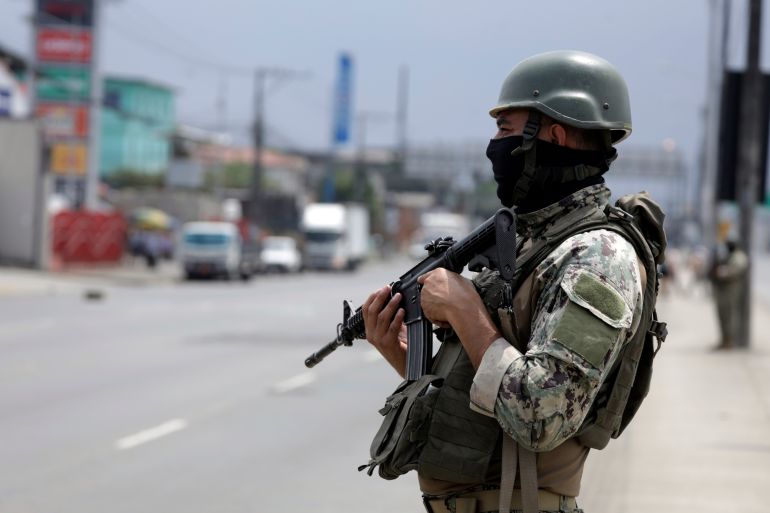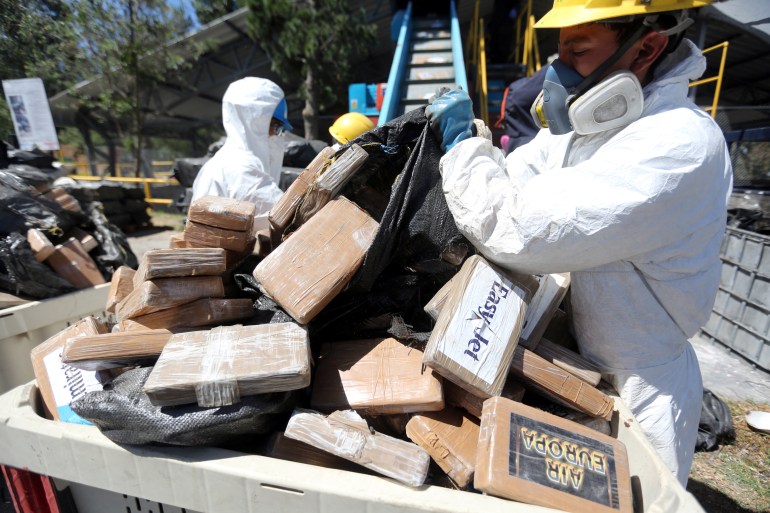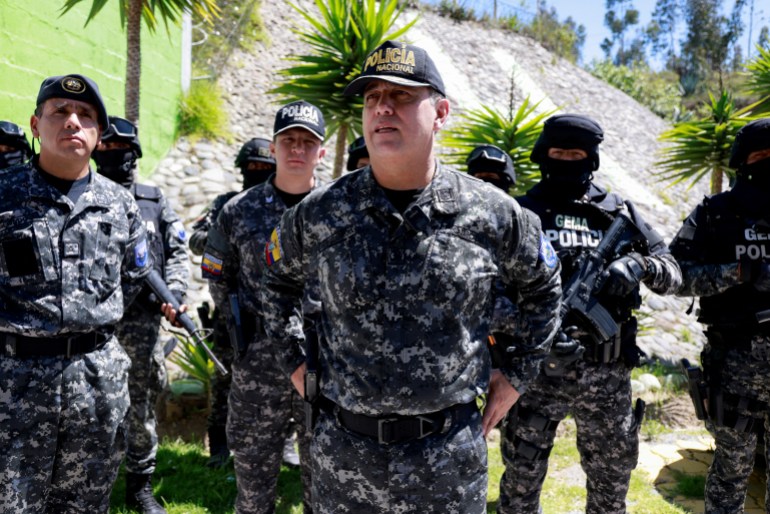Threats and street justice: How violence is transforming life in Ecuador
Residents are taking precautions to avoid clashes with the growing gang presence in Ecuador amid a state of emergency.

Quito, Ecuador – Maria could not foresee that her life was about to change because of a phone call.
A 48-year-old resident of Guayaquil, a port city in Ecuador, she had already seen her borough turned upside down by the presence of organised crime: Businesses had closed, neighbours had moved away and criminal gangs started fighting each other in the streets.
Keep reading
list of 3 itemsPhotos: Ecuador ‘in state of war’ against drug cartels’ terror campaign
Ecuador prison staff held hostage by inmates all freed
But she never expected to feel the effects of the crime directly. That changed when her phone rang a few months ago.
“A man told me that if I didn’t pay him $500 in a few hours, he would kidnap my children,” Maria, who asked to use a pseudonym, told Al Jazeera.
She ultimately paid the fee. Still, fearing further threats, she sent her children to live with relatives in another part of the country. “I cried and didn’t eat for almost three weeks, but I had no other choice,” Maria said.
Experiences like hers have grown increasingly common. Since 2018, Ecuador has struggled with violence as organised crime spreads and its economy falters.
Once dubbed “an island of peace”, the country is now home to one of the highest homicide rates in Latin America. In 2023 alone, there were 46.5 killings for every 100,000 people.
Earlier this month, a new wave of violence rattled the country. Riots gripped its prisons. Criminal leaders escaped custody. And masked gunmen stormed a live TV broadcast in Guayaquil, taking employees hostage.
In the span of 17 days, from January 9 to 25, the military and police detained 3,611 people, 237 of whom were charged with terrorism. Newly inaugurated President Daniel Noboa declared a nationwide state of emergency to fight the burgeoning crime.
But in the meantime, Ecuador’s crumbling security situation has transformed life for residents like Maria, particularly those in hard-hit cities like Guayaquil.

With a population of roughly 2.5 million and a bustling international harbour, Guayaquil has become a hotbed for illegal activity. In 2023, the province of Guayas, where the city is located, accounted for almost half of the country’s overall murders.
Maria remembers her Guayaquil community was peaceful before 2023. There was some drug dealing, but residents could take nighttime walks without fear, she said.
But everything changed in at the beginning of the year when two gangs started fighting for control of the territory.
A relatively small country tucked between Colombia and Peru — the world’s two largest cocaine producers — Ecuador has only recently turned into a major drug trafficking hub.
According to the Ecuadorian Organized Crime Observatory, international drug-trafficking operations like Sinaloa and the Jalisco New Generation Cartel took advantage of Ecuador’s weakened economy to strike agreements with local gangs — and recruit unemployed youth.
“They all came from our neighbourhood,” Maria said of the newer gang members. “We have watched them grow up since they were children. Then they got trapped in this.”
She added that the local gangs started blackmailing businesses and street vendors, demanding $100 fees. “A lot of families who lived by selling fish or bananas in the streets had to shut down their businesses, sometimes even leaving their homes.”

Private security for those who can afford it
Across the Guayas River, to the east of Guayaquil, lies Duran, a bustling industrial hub of 300,000 people. Over the last 15 years, local firms have boomed thanks to Duran’s favourable location: Shipments can easily travel up the river to the Pacific Ocean.
According to Ecuador’s central bank, the city now has the fifth highest gross domestic product (GDP) in the country.
But Duran has become a battlefield for two warring gangs: the Chone Killers and the Latin Kings. Local homicides jumped from 119 in 2022 to 407 in 2023, turning Duran into the most violent city in Ecuador.
“Entrepreneurs had to contract private security and armour their own cars to shield themselves from kidnappings,” said a spokesperson for the business group in Duran that represents manufacturing interests. He asked to remain anonymous.
According to the business group, there have been at least six abductions in the last year. “One of our members has just been threatened with the bombing of a power station next to his factory,” the spokesperson added.
He explained that those who suffer the most are small and mid-sized business owners, since they cannot afford the cost of extra security.
Gang members have also targeted shipping operations in recent months. Renato Gomez, the coordinator for Ecuador’s National Federation for Heavy Transport, said the situation for truck drivers has worsened since the beginning of 2021.
“They started stealing our cargo. Then they took whole vehicles, and finally, they kidnapped the drivers, amputating their fingers or even their hands and sending videos to their families,” Gomez told Al Jazeera.
At the height of the crisis, eight to 10 truck drivers were abducted daily for refusing to pay extortion fees, which often ranged from $4,000 to $20,000, Gomez said. In the last two years alone, 30 drivers have been murdered nationwide.
Gomez explained that he supports Noboa’s state of emergency, even though it imposes a curfew on everyday citizens and suspends other civil liberties.
Since the emergency declaration went into place, Gomez said there have been no further kidnappings. “We decided to make our fleet of trucks available to the armed forces because this is the fight of every Ecuadorian.”

Fear spreads beyond violence hotspots
Though much of the violence remains concentrated along coastal areas, as well as adjacent provinces like Los Rios, the effect has been widespread.
In the capital Quito, for instance, residents have reported taking added precautions. Nancy, a local food vendor who asked to be referred to by her first name only, has even adjusted her sales schedule.
Ordinarily, she travels the length of Carolina Park in her truck, selling fruit to locals who gather to relax or play volleyball in the open-air courts.
“I used to stay here selling mangos also at night, but now I quit at 6pm at the latest because of the insecurity,” she told Al Jazeera. Her sales have plunged almost by half.
Some boroughs in the capital have also resorted to policing themselves, even to the point of using violence to protect their communities.
Lower Carcelen, a popular neighbourhood in northern Quito, has a long tradition of grassroots organising: Its electrical grid and sewage system are the product of “minga”, an Indigenous word which means “collective work”.
In April, though, a member of the Lower Carcelen community was murdered. Simon, a local who asked to be called by a pseudonym, said rumours quickly spread throughout the neighbourhood that the victim, a local business owner, had either refused to pay an extortion fee or resisted a robbery.
Outraged, neighbours set up group chats to organise a response. When three alleged extortionists arrived to threaten another business, residents were ready and waiting, Simon said.
“All the people took to the streets and grabbed them. Somebody pushed to burn them alive, but in the end, the majority refused to turn into killers themselves,” he explained.
He added that his neighbours did, however, beat up the alleged gang members. The Quito-based newspaper El Comercio reported that the residents pummeled one woman with “sticks, punches and kicks” while two male suspects fled.
Police eventually arrived to disperse the crowd, which numbered in the hundreds, and detain the suspects.
Since then, Simon said he has heard of no other attempt to extort residents in Lower Carcelen. But he is aware of other illicit activities.
Many residents in Lower Carcelen have little education and work as informal street vendors. Simon pointed out that some nevertheless live opulent lifestyles — a fact he credits to illegal activities. “How can they build four-storey houses by selling potatoes on the streets?”
While Ecuador’s government faces steep pressure to crack down on illegal activity, teacher and social researcher Blanca Rivera is critical of “mano dura” or “iron fist” policies.
She has studied some of Guayaquil’s most neglected areas and feels a better solution would be to invest in social services and education. That way, teenagers would have alternatives to the gangs.
“There are entire neighbourhoods that don’t even have access to water,” Rivera said.
But the state of emergency has ensured a military presence in neighbourhoods like Maria’s. She has counted two raids in her neighbourhood, resulting in around 20 arrests, since the emergency designation was announced on January 8.
Still, Maria has embraced the changes. “I have seen no more killings nor shooting. I can finally walk on the streets of my community again,” she said. “We will need soldiers in the street forever.”